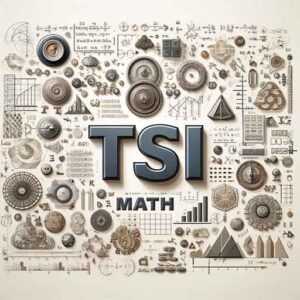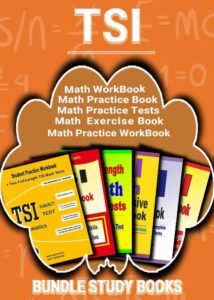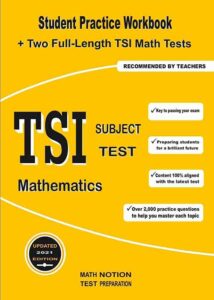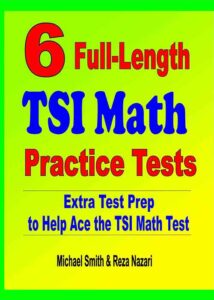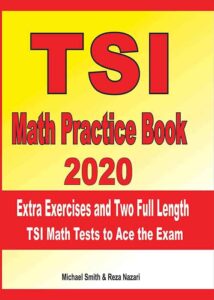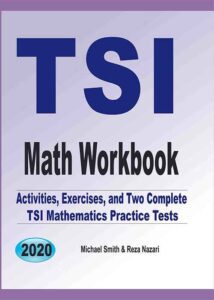
Study Time: 2minutes
TSI Math for Beginners: 10 Steps to Success in the “Detailed Solution Manual”
Introduction
Navigating the world of TSI Math can feel daunting, but the “TSI Math for Beginners” Detailed Solution Manual provides comprehensive insights and strategies tailored to simplify this journey. This guide covers foundational concepts to advanced problem-solving techniques and is your go-to resource for conquering the TSI Math Test.
Understanding the TSI Math Test
The TSI Math Test evaluates college readiness in key mathematical areas. Its structure includes sections on algebra, geometry, data analysis, and basic arithmetic. Each section plays a critical role in determining the test score, which is used to place students into appropriate college-level courses. Therefore, understanding the importance of each section and how it contributes to overall scoring is crucial.
TSI Math Basics
Success in the TSI Math Test starts with mastering the basics. Foundational concepts include:
- Fundamental Formulas: Essential formulas for arithmetic, algebra, and geometry.
- Basic Operations: Core arithmetic operations like addition, subtraction, multiplication, and division.
- Foundational Concepts: Ratios, percentages, and mathematical reasoning.
Number Concepts and Operations
A strong understanding of numbers is vital:
- Understanding Numbers: Distinguishing between integers, fractions, and decimals.
- Arithmetic Operations: Mastering addition, subtraction, multiplication, and division.
- Applications: Applying operations to solve real-world problems involving ratios and proportions.
Algebra and Functions
Algebra forms the backbone of the TSI Math Test:
- Linear Equations: How to solve and graph linear equations.
- Quadratic Equations: Factoring and solving quadratic equations.
- Graphing Functions: Understanding different types of functions and how to graph them.
Geometry and Measurement
Geometry and measurement require strong visualization skills:
- Fundamental Geometric Principles: Understanding shapes, angles, and properties.
- Area and Volume Calculations: Calculating the area and volume of various geometric figures.
Data Analysis and Statistics
Being able to interpret data is an essential skill:
- Understanding Data: Differentiating between different types of data sets.
- Descriptive Statistics: Measures of central tendency and variation.
- Interpreting Charts: Understanding data through graphs, histograms, and tables.
Problem-Solving Strategies
TSI Math Test challenges are best tackled with effective problem-solving:
- Analyzing Problems: Breaking down problems into manageable steps.
- Time Management: Allocating appropriate time per question.
- Working with Math Anxiety: Strategies to remain calm and focused.
Practice Test Tips
Preparation should include practical test-taking tips:
- Effective Test-Taking Strategies: Approach questions logically and eliminate incorrect answers.
- Managing Tricky Questions: Recognizing questions that require careful interpretation.
Common Mistakes to Avoid
Awareness of common pitfalls can significantly enhance performance:
- Misreading Questions: Carefully understanding what’s asked before answering.
- Calculation Errors: Double-checking arithmetic and operations.
- Misunderstanding Terminology: Familiarizing with key mathematical terms.
Study Plan for Success
A well-structured study plan is key:
- Creating a Study Schedule: Consistent, manageable daily or weekly goals.
- Leveraging Study Groups: Collaborating with peers for collective learning.
- Using Additional Resources: Utilizing online tutorials, textbooks, and practice tests.
TSI Math for Beginners Detailed Solution Manual
The “TSI Math for Beginners” Detailed Solution Manual provides comprehensive step-by-step solutions:
- Practice Problems: A wide range of practice problems with thorough explanations.
- Solution Walkthroughs: Detailed steps that clarify solution methods and reasoning.
- Self-Assessment: Tools and tips for identifying strengths and areas for improvement.
FAQs
What is the best way to prepare for the TSI Math Test?
- Begin by understanding the structure of the test and reviewing each section’s content. Create a study plan that allows consistent practice and includes varied resources.
Which topics are most important in TSI Math?
- The test emphasizes algebra, geometry, and data analysis. Master foundational concepts before tackling advanced problems.
How can I overcome math anxiety during the TSI Math Test?
- Practice mindfulness, read questions carefully, and apply relaxation strategies to stay focused.
Is it possible to improve TSI Math Test scores with this guide?
- Yes! Consistent practice with the guide’s strategies and solutions will enhance understanding and performance.
What if I don’t pass the TSI Math Test?
- There’s no need to worry. The test can be retaken, and focused practice will increase your chances of passing.
How much time should I spend studying for the TSI Math Test?
- Study time varies based on individual skill levels. Generally, allocate a few weeks for comprehensive preparation.
Conclusion
Preparing for the TSI Math Test may seem overwhelming, but success is within reach with structured guidance, diligent practice, and a positive mindset. The “TSI Math for Beginners” Detailed Solution Manual is your ultimate partner in this journey, helping you understand, practice, and excel in each section. Embrace the challenge confidently, and let this guide be your step-by-step companion!

